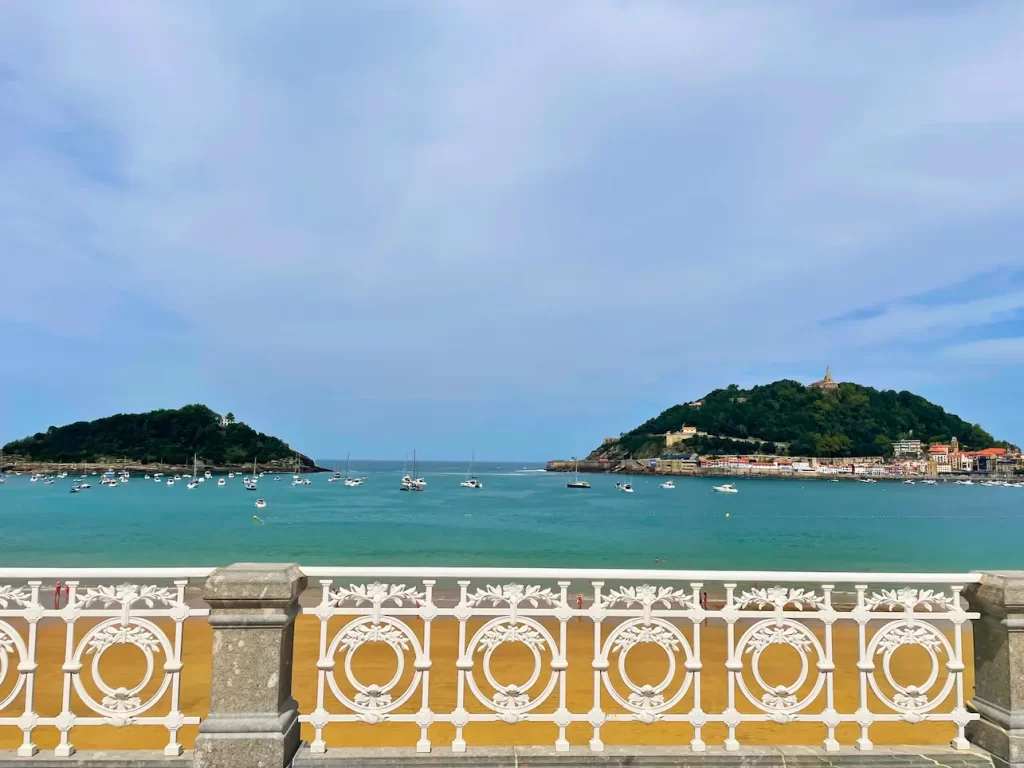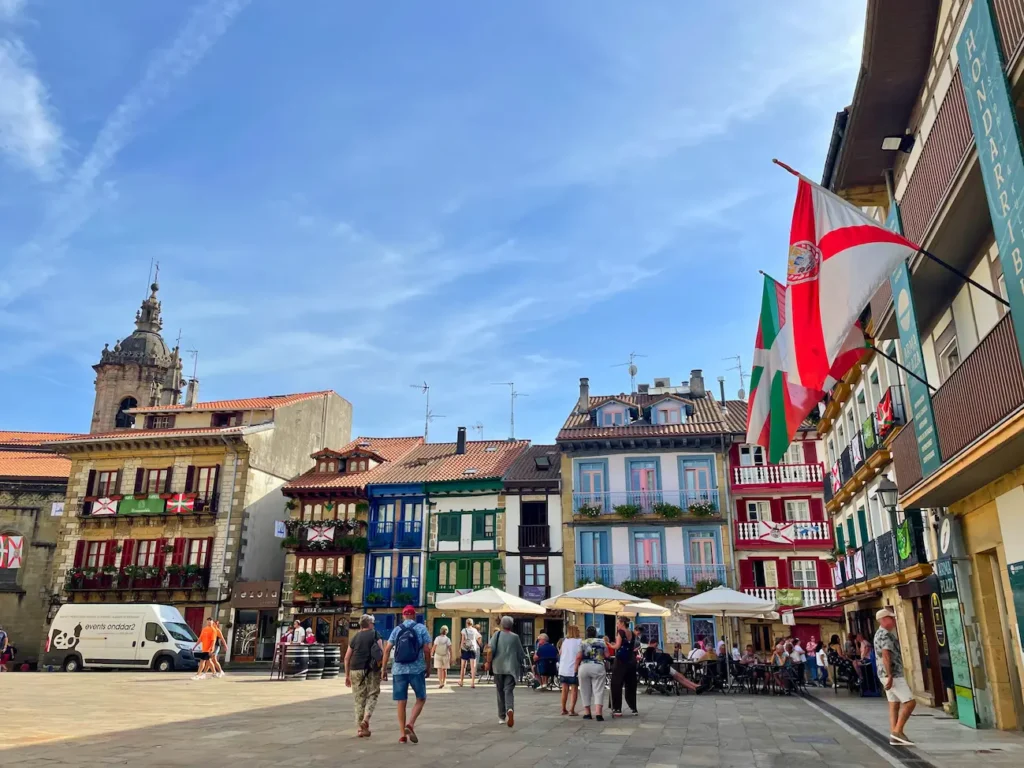English is not widely spoken in the Basque Country, neither by the younger nor older generations. Even in the tourism sector, it’s rare to find people who are proficient in English.
The highest concentration of English speakers can be found in tourist hubs like San Sebastián, but even there, the level is noticeably lower compared to other regions in Spain, such as Andalusia.
That said, we still had an amazing time exploring the Basque Country, and we truly believe it’s one of the most unique areas in Spain—with its own language, culture, and way of life.
Being able to communicate with locals can really shape your travel experience. While the language barrier might feel intimidating at first, don’t worry—we’ve put together a list of basic Spanish and Basque phrases to help you feel more confident and prepared.
Keep reading to get the most out of your trip to this beautiful part of Northern Spain!
What You'll Find In This Post:
What languages are spoken in the Basque Country?
There are two official languages in the Spanish Basque Country: Basque (Euskara) and Spanish. In areas near the French border, some locals also speak French.
If you’re driving through the region, the traffic signs can feel a bit overwhelming at first—they’re often written in four languages: Euskara, Spanish, French, and finally, English. It takes a little getting used to, but a helpful trick is to skip the first three lines and look straight to the bottom for the English version.
The Basque language is truly unique. It’s a language isolate, meaning it’s unrelated to any other known language family—including the Indo-European languages spoken across most of Europe. During the dictatorship of Francisco Franco, efforts were made to suppress Basque nationalism and limit the use of Euskara in public life.
Today, however, the Basque regional government actively promotes the use of the language. In about half of the schools, education is conducted entirely in Basque, with Spanish taught as a compulsory subject. In most of the remaining schools, classes are taught in a mix of Spanish and Basque, and it’s now very rare to find a school that teaches only in Spanish.
Do they speak Spanish in the Basque Country?
Spanish is one of the two official languages in the Basque Country. It is definitely a huge benefit to speak Spanish as a tourist in the Basque Country, and you will certainly have no problem to get around.
But don’t worry, you don’t have to be proficient in Spanish. We managed to get by even with our basic vocabulary. The locals are generally friendly and try to help and to understand you, especially when you are also making an effort to speak Spanish and not English.

Do they speak English in Bilbao?
English is not widely spoken in Bilbao, at least not yet.
While you may come across a few English-speaking guides, in our experience, this is more the exception than the rule. In most souvenir shops, bars, and restaurants, we struggled to find staff who spoke English. Many places didn’t even offer menus in English.
One of our local guides explained that Bilbao doesn’t receive a large number of English-speaking tourists. Instead, it has become increasingly popular with domestic travelers. For many years, Spaniards were hesitant to visit due to the region’s complicated past. But that’s changing—more and more locals are discovering the charm and beauty of the Basque Country.
As a result, people working in hospitality and tourism still have little incentive to learn or use English—at least for now. This may gradually shift as Bilbao continues to attract more international visitors.
That said, we did find good English speakers in a few key places:
- And, to some extent, at the reception of our hotel
- The tourist information office next to the Guggenheim Museum
- Inside the museum itself
👉 Read more: ONE Day In Bilbao? Here’s How To Spend It
Do they speak English in San Sebastián?
San Sebastián attracts the majority of English-speaking tourists in the Basque Country. As a result, English is more commonly spoken here than in other parts of the region—but to be fair, there’s still plenty of room for improvement. You’ll usually be able to communicate without too much trouble, even though the level of English is rarely fluent.
English menus aren’t widely available at bars and restaurants, so I recommend using a translation app to help navigate food choices.
That said, it was definitely easier to get around in San Sebastián compared to Bilbao. At major tourist spots—like the Mount Igueldo funicular (check our San Sebastián post below if you’re unfamiliar with it), La Concha beach, and in the Old Town—staff generally spoke decent English.
👉Check out our Ultimate One-Day Itinerary For San Sebastián HERE!

Do they speak English in Hondarribia?
Hondarribia is a small coastal town in the Basque Country, located right on the French border. The French town of Irun lies just across the Txingudi Bay. In addition to the official languages—Basque and Spanish—many locals speak French quite well due to the town’s proximity to France.
English, however, is very rarely spoken in Hondarribia.
During our stay, we visited a rather upscale restaurant where we expected the staff to speak at least basic English, as is often the case in more formal establishments. Unfortunately, that wasn’t so—the staff had extremely limited English and weren’t even able to answer simple questions about food allergens.
So, if you’re visiting Hondarribia, I’d recommend using Spanish or French as much as possible to get by.

basic phrases for your trip to the Basque Country:
Making an effort to use basic Basque or Spanish phrases will be appreciated by the locals, and it is also quite funny to immerse yourself in the local language. Here are some easy phrases for you to try on your trip to the Basque Country in both Euskara and Spanish.
Hello: Kaixo / Hola
Kaixo in Basque is pronounced “kai-sho” and Hola in Spanish – “o-la”.
Bye: Agur / Adiós
Agur in Basque is pronounced “a-gur”.
Thank you: Eskerrik asko / Gracias
To say thank you, say “es-ker-rik as-ko” in Basque.
Excuse me/ I’m sorry: Barkatu / Perdón
To say that you’re sorry or excuse me, say “bar-ka-tu” in Basque or “per-don” in Spanish.
Yes: Bai / Sí
Say “bye” in Basque.
No: Ez / No
Say “ez” in Basque.
Cheers: Txin-txin / Salud
Txin-txin in Basque is pronounced “chin-chin” and Salud in Spanish. Salud literally means health, and is used for “Bless you” after a sneeze or as a toast.
Do you speak English: Ba al dakizu ingelesez / Hablas inglés
Asking someone if they speak English is probably the most useful phrase. Say “bah al dah-kee-zu in-ge-leh-sez” in Basque. If you struggle, try it in Spanish – “a-blas in-gles”.
To Sum It All Up:
As of 2023, English is still not widely spoken in the Basque Country. With the region growing in popularity among international travelers, I’m hopeful this will improve in the coming years. Until then, I highly recommend learning a few basic Spanish phrases and using a translation app to help with menus and signs.
Fortunately, the Spanish people are generally very friendly and chatty, so with a little effort on both sides, you’ll be able to communicate and connect. As a visitor, your experience will be even richer if you’re open to trying some Spanish instead of relying solely on English.
¡Buen viaje!
Recent Posts
The Ultimate 5-Day Lapland Itinerary: Your Complete Arctic Adventure Guide
Ultimate 5-day Lapland itinerary: husky rides, frozen waterfalls, Northern Lights & Finnish sauna. Complete guide with accommodation tips.
Do You Need a Car in Lapland? Complete Rental Guide for Winter Travel
Wondering if you need a rental car in Lapland? Short answer: yes, if you want freedom beyond organized tours. Discover what it costs, how to choose the right vehicle, and essential winter driving...
